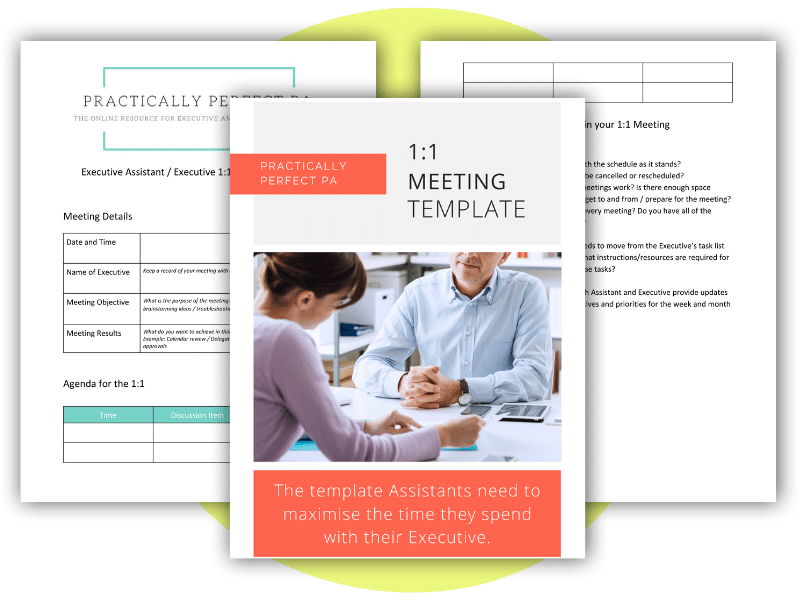Transforming wasteful meetings into productive ones
We all know that meetings are an essential way for teams to collaborate, share ideas, make decisions and progress projects. But we also know that many of those meetings are poorly run and unproductive and, of course, from an Assistant’s point of view, take up a significant amount of time to organise. Unsurprisingly, research indicates that up to 50% of meetings are a waste of time. As a result, considerable effort and energy go into organising unproductive meetings, leading to stress, frustration, and hindered productivity.
However, you can transform your meeting approach into valuable and efficient gatherings with the right strategies. This article will explore Dr Madeleine de Hauke’s Meeting Medicine approach, which provides actionable tips and tools to optimise your meeting experiences.
Part One: Raising Awareness
The first step towards improving meeting efficiency is awareness of the current meeting habits and challenges hindering productivity. Dr Madeleine de Hauke, a medical doctor turned meetings expert and executive coach, emphasises that awareness is curative – once you identify the issues, you can address them. To develop this awareness, Dr de Hauke poses five critical questions to assist in understanding the current meeting culture:
- How many hours does your manager spend in meetings on a typical day?
- How many hours do you spend on meeting-related tasks daily?
- What are your most significant pain points and frustrations about meeting-related tasks?
- What are the implications of these problems on you, your work, and your team?
- What are your manager’s most significant pain points and frustrations about the meetings they attend?
Part Two: Meeting Medicines for Effective Meetings
To combat the challenges identified in Part One, Dr Madeleine de Hauke introduces four meeting medicines, represented by the acronym “COPE”: Captain, Outcome, Process, and Equity of Thought.
- Captain: Just like a sailboat needs a captain to navigate successfully, meetings require a meeting leader to drive the team towards their goals. The captain’s role is crucial, and their effectiveness determines the outcome of the meeting. As an Assistant, you can support your manager in becoming an efficient meeting leader.
- Outcome: Every meeting must have a clearly defined intended effect. The captain (meeting leader) is responsible for articulating this outcome before the meeting takes place. Participants can better prepare and contribute meaningfully by including the intended outcome in the meeting invite and agenda.
- Process and Plan: Just as a sailboat needs a planned route, meetings require a well-thought-out process to reach the intended outcome. Assist your manager in devising a plan for the meeting, considering how to achieve the desired results effectively.
- Equity of Thought: Encourage your manager to ensure everyone has an equal opportunity to speak during the meeting. Meeting science reveals that decisions made with diverse perspectives and thoughts tend to be more effective. By keeping the number of participants manageable (ideally seven or fewer) and using tools like polls or questionnaires, your manager can create a conducive environment for everyone to contribute.
Part Three: Prevention and Mitigation
In Part Three, Dr Madeleine de Hauke suggests creating a team agreement to prevent common meeting problems from occurring. By anticipating these issues and agreeing on strategies to address them, you can minimise their impact on productivity. Take the time to fill in a template with answers to two crucial questions:
- How can I prevent a specific pain point from happening during the meeting?
- What will I do if that pain point arises during the meeting to minimise its effects?
By addressing these questions with your manager and team, you can establish a collaborative approach to meetings that maximises efficiency and fosters a culture of productivity.
In conclusion, optimising meetings is a game-changer for productivity and team success. By leveraging Dr Melinda Hook’s Meeting Medicine approach, you can turn the tide on wasteful meetings and steer towards a more efficient and rewarding work environment.
I encourage you to enrol in our Effective Meetings Online Course to enhance your meeting leadership skills and become your organisation’s change agent. This comprehensive program will equip you with the tools, techniques, and insights to master the art of conducting impactful and purposeful meetings. You’ll learn how to be a confident and effective meeting captain, set clear outcomes, plan for success, and ensure equitable participation among team members.
Don’t miss this opportunity to transform your meetings from time-wasters to productivity powerhouses. Join our online course today and take the first step towards creating a meeting culture that fosters achievement and collaboration. Your manager and team will be grateful for the positive change, and you’ll be well on your way to becoming the go-to-meeting expert in your workplace.





